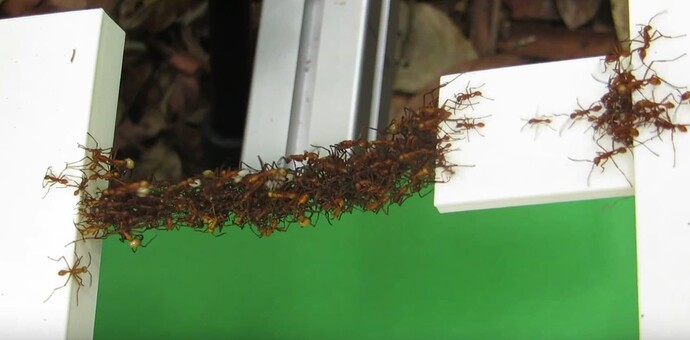I wish I could see all things as grandly, but alas, I cannot.
Thank you lord for the elephant, and all your works, as you have made them mighty how more so must you be!
In the Catholic Church we have a lot of set prayers, some I prefer over others. I prefer the Orthodox Jesus Prayer to all others, but not at all to the detriment of the others.
I should see things this way.
I guess I need to disconnect ‘being a flawed human being’ from ‘doing something morally wrong’.
Between intellectual and moral flaws.
And I’d be surprised if any saint who ever lived was ‘intellectually’ perfect as I’ve described.
Who can? I certainly can’t. I believe that lately, God has given me eyes to see him and ears to hear him in his creation more clearly than I ever have. And yet what I see is a glimpse and what I hear is a snatch of the true reality.
But one day… one day… you and I will look out on a New Creation and see God’s hand so profoundly and perfectly in it that our hearts will (figuratively) explode in wonder and worship. In the meantime, we limp our way towards that reality.
My experience of pastoral ministry was always that those who cared the most about pleasing God were least satisfied with the state of their sanctification. Be encouraged, you are in good company.
A crucial verse that I have repeated often here for one reason or another is Hebrews 12:2 –
Let us fix our eyes on Jesus, the author and perfecter of our faith, who for the joy set before Him endured the cross, scorning its shame…
One reason I cite it is to point out our Lord’s motivation, but here because it speaks to our behavior and to what we should always be aware of. Adapted from William James via David Brooks is the idea that we make a continuous moral choice as to what we pay attention to. If we are concentrating on our own or others’ sinfulness much of the time, we have good reason to be depressed or discouraged! But then we are not paying attention to what we ought. I find the Psalms a helpful lens to properly focus my attention.
For now, my worldview is less ‘how do I be perfect’ and more ‘how do I glorify God?’.
And my thoughts are that if I put too much pressure into seeing God ‘equally’ in a tiny ant as in a blue whale, I’d distract myself from glorifying him to the best of my ability.
Does this mean I’m settling for imperfection?
I admit this ordeal has changed me somewhat in my mindset. I do think there is a greater ‘ideal’ which is seeing God’a glory maximally in all things, but I also need to be realistic and say that I’m probably not going to reach said ideal for some time, if ever, and certainly not through rushing or forcing myself into it.
If I do force myself into it, I won’t reach it at all, since I won’t be glorifying God to the best of my ability. I’d be distracting myself from it.
And as regards to my ability, I see God more in charismatic megafauna, colourful birds and colourful fish than in rocks, ants and blades of grass.
Plus, and perhaps the is is most important, I have a limited time in this world, and thus I cannot learn the secrets and ins and outs of everything.
And there’s already a large amount of things I’ve devoted my life to learning about. Elephants being one such thing. Can’t learn it all.
A way better perspective and not intrinsically counterproductive, attention directed toward God and not self! Something we all need to work at:
At most, all I learn about God from microbes and pieces from dirt is that God is a mystery that we do not always understand.
(Which I learn from many other things as well)
(And that’s okay, since, as I said, I’ve devoted my life to learning about other things, I can’t, realistically learn everything)
I thank people for helping me out through this tough time. Just glad I brought this up now and not too late.
Or, as happened with me, a fallen leaf a current brought to me as I sat reading by a river.
Though as rocks go, I’d say it depends on the rock – for example,
I was going to say I see God in ants, but it strikes me that what I’m really thinking of isn’t individual ants but colonies, especially like these:
I’ve never encountered a colony taller than I am, but I’ve come across some that were waist high a one that was chest high. The above picture must have been taken on a cold day because every colony with that kind of mound has been swarming with ants busily bringing more pine and hemlock needles and bits of dirt to add to the mound. I’ve poked small holes in a mound and left the twig in the hole then sat and watched as they either pulled it out and patched the hole or incorporated it into the structure. More interesting was when I stacked some sticks to get the opening of a glass jar right up to touch the mound and left it there while I hiked onward; when I came back they’d started building not just around but inside of the jar.
Then there’s their "bio-engineering–
That’s a bridge made of ants clinging to each other. I watched one day as one ant anchored itself to the end of a stick, then another ant crawled over the first and held on, then a third went out, and so on. When the bridge was six ants long – and still sticking straight out from the stick! – a new ant placed himself under the first and second ants, I presume to add support. At about eight ants, ants started arriving at the other side of the gap and assembled themselves into a bridge reaching towards the first one, and they met in the middle. The moment the ends were joined they started widening and strengthening the bridge, and shortly had it ready for a dozen ants dragging the body of a caterpillar. I tracked the trail the ants had been using before they built the bridge; it was easily ten feet longer! Apparently their spatial perception is such that some ants had run out the original stick and back, and others had run out the fallen branch they’d bridged to, and they reckoned that those two points were only two dozen ants apart. Given their movement rate, the team hauling the caterpillar body would have needed four minutes to go the long way versus half a minute using the bridge – a major savings in time and labor.
But in terms of showing what God is like, the word that comes to me is “steadfast” because those ants serving as a bridge stayed locked in place all afternoon while their comrades hauled food and supplies across.
(In kind of a visual pun, the rock visage could be a sweater? In situ, I’m sure not, but as framed… ; - )
And the ant bridge, wow – very cool!
Right there is the reason I often think I’d like to live a thousand years, so I could master every subject as well as I’ve presently mastered a few.
I’m feeling a bit better now.
I’m starting to realise that it isn’t an either/or situation. I should be trying to see God’s work and grace in all things, but If something brings me closer to God, I ‘should’ do it, at least until I find something that can compensate for it. (Which might not ever happen)
If anything it would be sinful to ignore that calling, if it means I don’t give God as much glory as I could.
To be fair, with eusocial insects and especially ants the individual and the colony is a pretty arbitrary distinction that is more important to humans than the ants.
On one level the colony is the organism. ![]()
If you like ants though you’ll get a massive kick out of Alex Wild’s photography!
PS. ants are flippin’ awesome insects.
Seeing God’s work in everything is the essence of theism.
The work of science to discover the laws of nature does not require Deism.
It simply requires the understanding that God created for a relationship and that is why God created the laws of nature… not so He could sit back and watch, but simply to have something to interact with and form relationships with.
I was reminded of how a biology professor related how they’d discovered arboreal ants on a “sky island” in the tropics in central America, that an individual tree would have multiple nests that were all the same “society”, and when circumstances brought two neighboring trees into contact there would be continual battles fought at the point(s) of contact.
Or both. My perspective on the first dozen billion years of the universe God just enjoyed observing the development.
This made me think about what I was reading recently about the qualities of an organism present in each one of its cells in a recently completed chapter in The Matter With Things by Iain McGilchrist. Perhaps it would interest you as well in the context of an ant as a sort of mobile cell in the organism of a colony:
Here is cell biologist Bruce Lipton:
Each cell is an intelligent being that can survive on its own, as scientists demonstrate when they remove individual cells from the body and grow them in a culture … these smart cells are imbued with intent and purpose; they actively seek environments that support their survival while simultaneously avoiding toxic or hostile ones. Like humans, single cells analyse thousands of stimuli from the microenvironment they inhabit. Through the analysis of this data, cells select appropriate behavioural responses to ensure their survival. Single cells are also capable of learning through these environmental experiences and are able to create cellular memories, which they pass on to their offspring.131
It seems to me, given everything else we know, that the explanatory burden is on those who would have mindless mechanisms give rise to sentient beings to tell us how, why and at what point they do so. We have seen that one aspect of nature, both animate and inanimate, is its tendency to repeat patterns at different levels of the same whole: fractality. When one compares the single cell to the whole organism to which it belongs – in other words, over the most colossal scale – one finds that common to each are the needs to co-ordinate information, to exchange energy with the surroundings, to have a functioning system of internal distribution, to have the ability to repair and protect itself, to exert ‘border control’, and to have the capacity to carry on producing itself. In fact, zooming outwards from the human individual to society, rather than inwards to the single cell, one finds the same fractal pattern – the same needs – much as one might expect. Those needs and drives that we know at one level as explicit are implicit at other levels; there is no absolute, merely a relative, difference in kind as the scale changes.
And later again quoting from Lipton:
… Even though humans are made up of trillions of cells … there is not one ‘new’ function in our bodies that is not already expressed in the single cell. Virtually every eukaryote [cell that includes a nuclear membrane] possesses the functional equivalent of our nervous system, digestive system, respiratory system, excretory system, endocrine system, muscle and skeletal systems, circulatory system, integument (skin), reproductive system, and even a primitive immune system, which utilises a family of antibody-like ‘ubiquitin’ proteins.132


